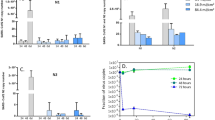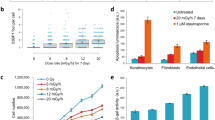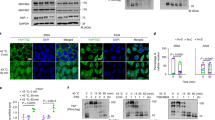Abstract
The reactivation of U.V.-irradiated adenovirus 2 in HeLa cells is enhanced 8-9 fold if the cells are given a brief hyperthermic shock before infection. Maximum reactivation is achieved by heating for 10 min at 45.5 degrees C and with a delay of 36 h between heating and infection. The induction process requires protein synthesis only during the 3 h period immediately following heating, cycloheximide does not prevent the expression of enhanced reactivation if added to the cells after this time. Heat-enhanced reactivation exhibits properties similar in some respects to radiation-enhanced reactivation and indicates an increased capacity of the heated cells to tolerate DNA damage.
This is a preview of subscription content, access via your institution
Access options
Subscribe to this journal
Receive 24 print issues and online access
$259.00 per year
only $10.79 per issue
Buy this article
- Purchase on Springer Link
- Instant access to full article PDF
Prices may be subject to local taxes which are calculated during checkout
Similar content being viewed by others
Rights and permissions
About this article
Cite this article
Piperakis, S., McLennan, A. Hyperthermia enhances the reactivation of irradiated adenovirus in HeLa cells. Br J Cancer 49, 199–205 (1984). https://doi.org/10.1038/bjc.1984.32
Issue Date:
DOI: https://doi.org/10.1038/bjc.1984.32



